|
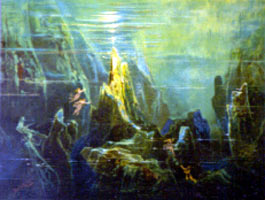 Deep in the Rhine, three of the river's daughters, custodians of a golden treasure, laugh while they play, scarcely noticing when Alberich emerges from a crevice. Seized by desire, the gnome tries to catch the Rhinemaidens as they dart through the waters, but his clumsy attempts lead to frustration. Taunts from his quarry merely quicken the Nibelung's lust and anger. Suddenly sunlight illuminates the summit of a rock - the Rhinegold. Hailing the precious hoard, the nymphs are astonished that Alberich does not know what it represents. The Rhinegold is all-powerful, they explain to him, and were it fashioned into a Ring, the wearer would rule the world. But the gold is safe, they continue confidently, for whoever would steal the treasure must renounce love. The Nibelung vows to seize the gold. Scrambling up the rock, Alberich forswears love, wrests the prize free and escapes. The waters are plunged into darkness as the Rhinemaidens lament their loss.
Deep in the Rhine, three of the river's daughters, custodians of a golden treasure, laugh while they play, scarcely noticing when Alberich emerges from a crevice. Seized by desire, the gnome tries to catch the Rhinemaidens as they dart through the waters, but his clumsy attempts lead to frustration. Taunts from his quarry merely quicken the Nibelung's lust and anger. Suddenly sunlight illuminates the summit of a rock - the Rhinegold. Hailing the precious hoard, the nymphs are astonished that Alberich does not know what it represents. The Rhinegold is all-powerful, they explain to him, and were it fashioned into a Ring, the wearer would rule the world. But the gold is safe, they continue confidently, for whoever would steal the treasure must renounce love. The Nibelung vows to seize the gold. Scrambling up the rock, Alberich forswears love, wrests the prize free and escapes. The waters are plunged into darkness as the Rhinemaidens lament their loss.
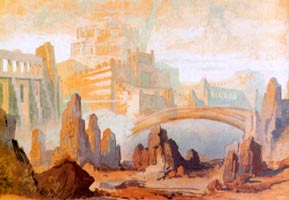 As the sun rises over a mountainous plateau, Fricka and Wotan slumber on a bank of flowers. A fortress, their new home, gleams in the distance. When the two gods awaken, Wotan hails the building as a fulfillment of his dreams. Fricka reproaches her husband for having promised her sister Freia to the giants Fafner and Fasolt as payment for constructing the castle. Wotan replies that he never meant to keep the bargain. As the terrified Freia runs in, pursued by Fafner and Fasolt, Wotan says Loge (fire) will help the gods out of their dilemma. The giants advance to claim their reward. When Wotan protests he made the pact in jest, that they must settle for another fee, Fasolt, smitten with Freia, balks. Fafner, intrigued that the loss of Freia's golden apples would cost the gods their eternal youth and therefore their power, decides the goddess must be abducted. As the giants drag her away, Froh (spring) and Donner (thunder) bar their path, Donner brandishing his hammer. Wotan intervenes, saying all treaties are guaranteed on his spear. Denied Freia's golden apples, the gods begin to age.
As the sun rises over a mountainous plateau, Fricka and Wotan slumber on a bank of flowers. A fortress, their new home, gleams in the distance. When the two gods awaken, Wotan hails the building as a fulfillment of his dreams. Fricka reproaches her husband for having promised her sister Freia to the giants Fafner and Fasolt as payment for constructing the castle. Wotan replies that he never meant to keep the bargain. As the terrified Freia runs in, pursued by Fafner and Fasolt, Wotan says Loge (fire) will help the gods out of their dilemma. The giants advance to claim their reward. When Wotan protests he made the pact in jest, that they must settle for another fee, Fasolt, smitten with Freia, balks. Fafner, intrigued that the loss of Freia's golden apples would cost the gods their eternal youth and therefore their power, decides the goddess must be abducted. As the giants drag her away, Froh (spring) and Donner (thunder) bar their path, Donner brandishing his hammer. Wotan intervenes, saying all treaties are guaranteed on his spear. Denied Freia's golden apples, the gods begin to age.
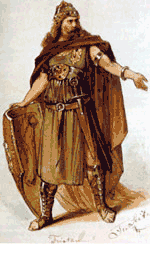 Loge, who originated the contract with the giants, and who at Wotan's command has been trying to find a suitable payment in lieu of Freia, materializes in a puff of smoke. The crafty god suggests that perhaps the Rhinegold might be an acceptable substitute. He then relates how Alberich stole the hoard, forging it into a Ring through which he can gain world dominance. Wotan is enthralled by the absolute power the Ring imparts, and when Fricka learns a wife could use the Ring to keep a philandering husband faithful, she urges Wotan to obtain it. Since the Rhinemaidens want Wotan to restore the gold to them, proposes Loge, why not steal it, as Alberich did? Fafner, who wants the gold, advises Wotan to use his wits to gain the treasure. Then, taking Freia hostage until evening, when the Nibelung's hoard must be delivered as ransom, the giants leave. No sooner does Freia disappear than the gods begin to weaken and age. Wotan, forced to make a decision, bids Loge accompany him to the nether world to seek Alberich's treasure.
Loge, who originated the contract with the giants, and who at Wotan's command has been trying to find a suitable payment in lieu of Freia, materializes in a puff of smoke. The crafty god suggests that perhaps the Rhinegold might be an acceptable substitute. He then relates how Alberich stole the hoard, forging it into a Ring through which he can gain world dominance. Wotan is enthralled by the absolute power the Ring imparts, and when Fricka learns a wife could use the Ring to keep a philandering husband faithful, she urges Wotan to obtain it. Since the Rhinemaidens want Wotan to restore the gold to them, proposes Loge, why not steal it, as Alberich did? Fafner, who wants the gold, advises Wotan to use his wits to gain the treasure. Then, taking Freia hostage until evening, when the Nibelung's hoard must be delivered as ransom, the giants leave. No sooner does Freia disappear than the gods begin to weaken and age. Wotan, forced to make a decision, bids Loge accompany him to the nether world to seek Alberich's treasure.
The clang of anvils pervades the dark caverns of Nibelheim, Alberich's domain, where he drives his slaves to mine gold to swell his hoard. Wearing the all-powerful Ring, the gnome torments Mime for the Tarnhelm he is fashioning. Mime, who covets this latest marvel for himself, must submit, and Alberich tries on the helmet, which transforms the wearer into any size or shape. The Tarnhelm also enables Alberich to become invisible, and he thrashes his defenseless brother, then vanishes to terrorize others.
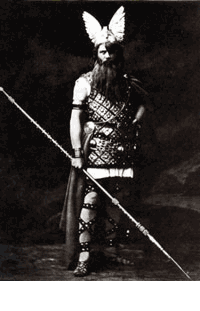 Soon Wotan and Loge descend through a shaft before the cowering Mime, who complains of Alberich's tyranny, saying he had hoped to outwit his brother by means of the Tarnhelm, regaining the Ring he forged. Unrecognized and amused by the complaining gnome, the gods offer to help the Nibelungs free themselves. Now Alberich returns, driving slaves who bear mounds of gold. He knows Wotan and Loge and suspiciously questions their trip to Nibelheim, arrogantly warning of his plan to overthrow the gods and rule the world. Loge asks the Nibelung what would happen if someone stole the Ring while he slept. How could they, the gnome asks, extolling the powers of the Tarnhelm. When Loge, feigning disbelief, asks for a demonstration, Alberich transforms himself into a large serpent, then back again. Loge asks whether the Tarnhelm can turn him into something small - a toad, for instance - so he can hide. Obligingly, Alberich becomes a toad, whereupon Wotan traps him under his foot and Loge seizes the Tarnhelm. As Alberich resumes his accustomed shape, he is tied and dragged by his captors to the surface of the earth.
Soon Wotan and Loge descend through a shaft before the cowering Mime, who complains of Alberich's tyranny, saying he had hoped to outwit his brother by means of the Tarnhelm, regaining the Ring he forged. Unrecognized and amused by the complaining gnome, the gods offer to help the Nibelungs free themselves. Now Alberich returns, driving slaves who bear mounds of gold. He knows Wotan and Loge and suspiciously questions their trip to Nibelheim, arrogantly warning of his plan to overthrow the gods and rule the world. Loge asks the Nibelung what would happen if someone stole the Ring while he slept. How could they, the gnome asks, extolling the powers of the Tarnhelm. When Loge, feigning disbelief, asks for a demonstration, Alberich transforms himself into a large serpent, then back again. Loge asks whether the Tarnhelm can turn him into something small - a toad, for instance - so he can hide. Obligingly, Alberich becomes a toad, whereupon Wotan traps him under his foot and Loge seizes the Tarnhelm. As Alberich resumes his accustomed shape, he is tied and dragged by his captors to the surface of the earth.
Once more on the plateau, Loge and Wotan inform their prisoner he cannot go free without forfeiting his hoard as ransom. Though outraged, he acquiesces, certain that through the Ring he can replenish his fortune. Loge unties his right hand, enabling Alberich to kiss the Ring to summon his slaves, who haul up the gold. The gods' command obeyed, he asks for the return of the Tarnhelm, but Loge says the gods will keep it. Wotan adds that the Ring also must be part of the booty, reminding the gnome that it was not rightfully his. Alberich retorts that Wotan is as much a thief as he, but this does not prevent the god from tearing the Ring from Alberich's finger. As Loge unfastens the Nibelung's bonds, the embittered gnome hurls forth a curse on the Ring: until it returns to his hand, may care, envy and death befall all who possess it.
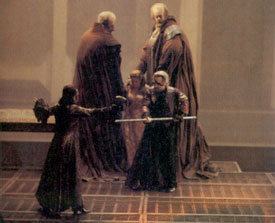 Alberich disappears as the other gods approach, followed by the giants with their hostage, Freia. Saddened at losing the goddess, Fasolt agrees to accept the Nibelung hoard only if it hides her from his view. The brothers thrust their clubs into the ground to support the treasure, which Loge and Froh heap up in front of Freia. Fafner complains that the gold is not quite enough - he can still see Freia's hair through a crack - forcing Loge to add the Tarnhelm to the hoard. Then Fasolt complains he can see the gleam of Freia's eye through a chink. At this Fafner demands the Ring, now on Wotan's finger. When Wotan refuses, the giants pull Freia from behind the hoard to abduct her. But darkness covers the mountaintop as a cleft in the ground opens and Erda materializes, roused from perpetual sleep by the conflict. The earth goddess warns Wotan to yield the Ring, which spells doom for the gods. Persuaded, Wotan tosses the Ring onto the hoard, whereupon Freia is released. At once Alberich's curse takes effect: the brothers quarrel over the spoils. Fafner kills Fasolt, claiming Ring, Tarnhelm and hoard for himself.
Alberich disappears as the other gods approach, followed by the giants with their hostage, Freia. Saddened at losing the goddess, Fasolt agrees to accept the Nibelung hoard only if it hides her from his view. The brothers thrust their clubs into the ground to support the treasure, which Loge and Froh heap up in front of Freia. Fafner complains that the gold is not quite enough - he can still see Freia's hair through a crack - forcing Loge to add the Tarnhelm to the hoard. Then Fasolt complains he can see the gleam of Freia's eye through a chink. At this Fafner demands the Ring, now on Wotan's finger. When Wotan refuses, the giants pull Freia from behind the hoard to abduct her. But darkness covers the mountaintop as a cleft in the ground opens and Erda materializes, roused from perpetual sleep by the conflict. The earth goddess warns Wotan to yield the Ring, which spells doom for the gods. Persuaded, Wotan tosses the Ring onto the hoard, whereupon Freia is released. At once Alberich's curse takes effect: the brothers quarrel over the spoils. Fafner kills Fasolt, claiming Ring, Tarnhelm and hoard for himself.
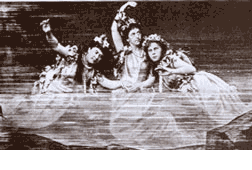 After he has gone, Fricka bids Wotan turn his thoughts to their new home. Donner summons
lightning and thunder to dispel thick mists that have enveloped the mountaintop.
As the heavens clear, a rainbow forms a bridge to the fortress.
Noting how the setting sun gilds the noble structure, Wotan tells Fricka their
abode is called Valhalla. As Wotan leads the other gods across the rainbow -
all except Loge, who mutters that they are going to their doom - the Rhinemaidens
are heard from the valley below, grieving for their lost treasure.
After he has gone, Fricka bids Wotan turn his thoughts to their new home. Donner summons
lightning and thunder to dispel thick mists that have enveloped the mountaintop.
As the heavens clear, a rainbow forms a bridge to the fortress.
Noting how the setting sun gilds the noble structure, Wotan tells Fricka their
abode is called Valhalla. As Wotan leads the other gods across the rainbow -
all except Loge, who mutters that they are going to their doom - the Rhinemaidens
are heard from the valley below, grieving for their lost treasure.
DAS RHEINGOLD
Scene Four
ALBERICH:
Bin ich nun frei?
mit wütendem Lachen
Wirklich frei?
So grüß' euch denn
meiner Freiheit erster Gruß! -
Wie durch Fluch er mir geriet,
verflucht sei dieser Ring!
Gab sein Gold mir Macht ohne Maß,
nun zeug' sein Zauber Tod dem, der ihn trägt!
Kein Froher soll seiner sich freun,
keinem Glücklichen lache sein lichter Glanz!
Wer ihn besitzt, den sehre die Sorge,
und wer ihn nicht hat, den nage der Neid!
Jeder giere nach seinem Gut,
doch keiner genieße mit Nutzen sein!
Ohne Wucher hüt' ihn sein Herr;
doch den Würger zieh' er ihm zu!
Dem Tode verfallen, feßle den Feigen die Furcht:
solang er lebt, sterb' er lechzend dahin,
des Ringes Herr als des Ringes Knecht:
bis in meiner Hand den geraubten wieder ich halte! -
So segnet in höchster Not
der Nibelung seinen Ring!
Behalt' ihn nun,
lachend
hüte ihn wohl:
meinem Fluch fliehest du nicht!
Er verschwindet schnell in der Kluft.
Der dichte Nebelduft des Vordergrundes klärt sich allmählich auf.
top
DAS RHEINGOLD
Scene Two
LOGE:
So weit Leben und Weben,
In Wasser, Erd' und Luft,
viel frug' ich, forschte bei allen,
wo Kraft nur sich rührt, und Keime sich regen:
was wohl dem Manne mächt'ger dünk',
als Weibes Wonne und Wert?
Doch so weit Leben und Weben,
verlacht nur ward meine fragende List:
in Wasser, Erd' und Luft,
lassen will nichts von Lieb' und Weib.
Nur einen sah' ich, der sagte der Liebe ab:
um rotes Gold entriet er des Weibes Gunst.
Des Rheines klare Kinder
klagten mir ihre Not:
der Nibelung, Nacht-Alberich,
buhlte vergebens um der Badenden Gunst;
das Rheingold da
raubte sich rächend der Dieb:
das dünkt ihn nun das teuerste Gut,
hehrer als Weibes Huld.
Um den gleißenden Tand,
der Tiefe entwandt,
erklang mir der Töchter Klage:
an dich, Wotan, wenden sie sich,
daß zu Recht du zögest den Räuber,
das Gold dem Wasser wieder gebest,
und ewig es bliebe ihr Eigen.
|











 Download full version of Ring movie
Download full version of Ring movie




 Deep in the Rhine, three of the river's daughters, custodians of a golden treasure, laugh while they play, scarcely noticing when Alberich emerges from a crevice. Seized by desire, the gnome tries to catch the Rhinemaidens as they dart through the waters, but his clumsy attempts lead to frustration. Taunts from his quarry merely quicken the Nibelung's lust and anger. Suddenly sunlight illuminates the summit of a rock - the Rhinegold. Hailing the precious hoard, the nymphs are astonished that Alberich does not know what it represents. The Rhinegold is all-powerful, they explain to him, and were it fashioned into a Ring, the wearer would rule the world. But the gold is safe, they continue confidently, for whoever would steal the treasure must renounce love. The Nibelung vows to seize the gold. Scrambling up the rock, Alberich forswears love, wrests the prize free and escapes. The waters are plunged into darkness as the Rhinemaidens lament their loss.
Deep in the Rhine, three of the river's daughters, custodians of a golden treasure, laugh while they play, scarcely noticing when Alberich emerges from a crevice. Seized by desire, the gnome tries to catch the Rhinemaidens as they dart through the waters, but his clumsy attempts lead to frustration. Taunts from his quarry merely quicken the Nibelung's lust and anger. Suddenly sunlight illuminates the summit of a rock - the Rhinegold. Hailing the precious hoard, the nymphs are astonished that Alberich does not know what it represents. The Rhinegold is all-powerful, they explain to him, and were it fashioned into a Ring, the wearer would rule the world. But the gold is safe, they continue confidently, for whoever would steal the treasure must renounce love. The Nibelung vows to seize the gold. Scrambling up the rock, Alberich forswears love, wrests the prize free and escapes. The waters are plunged into darkness as the Rhinemaidens lament their loss.
 As the sun rises over a mountainous plateau, Fricka and Wotan slumber on a bank of flowers. A fortress, their new home, gleams in the distance. When the two gods awaken, Wotan hails the building as a fulfillment of his dreams. Fricka reproaches her husband for having promised her sister Freia to the giants Fafner and Fasolt as payment for constructing the castle. Wotan replies that he never meant to keep the bargain. As the terrified Freia runs in, pursued by Fafner and Fasolt, Wotan says Loge (fire) will help the gods out of their dilemma. The giants advance to claim their reward. When Wotan protests he made the pact in jest, that they must settle for another fee, Fasolt, smitten with Freia, balks. Fafner, intrigued that the loss of Freia's golden apples would cost the gods their eternal youth and therefore their power, decides the goddess must be abducted. As the giants drag her away, Froh (spring) and Donner (thunder) bar their path, Donner brandishing his hammer. Wotan intervenes, saying all treaties are guaranteed on his spear. Denied Freia's golden apples, the gods begin to age.
As the sun rises over a mountainous plateau, Fricka and Wotan slumber on a bank of flowers. A fortress, their new home, gleams in the distance. When the two gods awaken, Wotan hails the building as a fulfillment of his dreams. Fricka reproaches her husband for having promised her sister Freia to the giants Fafner and Fasolt as payment for constructing the castle. Wotan replies that he never meant to keep the bargain. As the terrified Freia runs in, pursued by Fafner and Fasolt, Wotan says Loge (fire) will help the gods out of their dilemma. The giants advance to claim their reward. When Wotan protests he made the pact in jest, that they must settle for another fee, Fasolt, smitten with Freia, balks. Fafner, intrigued that the loss of Freia's golden apples would cost the gods their eternal youth and therefore their power, decides the goddess must be abducted. As the giants drag her away, Froh (spring) and Donner (thunder) bar their path, Donner brandishing his hammer. Wotan intervenes, saying all treaties are guaranteed on his spear. Denied Freia's golden apples, the gods begin to age.
 Loge, who originated the contract with the giants, and who at Wotan's command has been trying to find a suitable payment in lieu of Freia, materializes in a puff of smoke. The crafty god suggests that perhaps the Rhinegold might be an acceptable substitute. He then relates how Alberich stole the hoard, forging it into a Ring through which he can gain world dominance. Wotan is enthralled by the absolute power the Ring imparts, and when Fricka learns a wife could use the Ring to keep a philandering husband faithful, she urges Wotan to obtain it. Since the Rhinemaidens want Wotan to restore the gold to them, proposes Loge, why not steal it, as Alberich did? Fafner, who wants the gold, advises Wotan to use his wits to gain the treasure. Then, taking Freia hostage until evening, when the Nibelung's hoard must be delivered as ransom, the giants leave. No sooner does Freia disappear than the gods begin to weaken and age. Wotan, forced to make a decision, bids Loge accompany him to the nether world to seek Alberich's treasure.
Loge, who originated the contract with the giants, and who at Wotan's command has been trying to find a suitable payment in lieu of Freia, materializes in a puff of smoke. The crafty god suggests that perhaps the Rhinegold might be an acceptable substitute. He then relates how Alberich stole the hoard, forging it into a Ring through which he can gain world dominance. Wotan is enthralled by the absolute power the Ring imparts, and when Fricka learns a wife could use the Ring to keep a philandering husband faithful, she urges Wotan to obtain it. Since the Rhinemaidens want Wotan to restore the gold to them, proposes Loge, why not steal it, as Alberich did? Fafner, who wants the gold, advises Wotan to use his wits to gain the treasure. Then, taking Freia hostage until evening, when the Nibelung's hoard must be delivered as ransom, the giants leave. No sooner does Freia disappear than the gods begin to weaken and age. Wotan, forced to make a decision, bids Loge accompany him to the nether world to seek Alberich's treasure.
 Soon Wotan and Loge descend through a shaft before the cowering Mime, who complains of Alberich's tyranny, saying he had hoped to outwit his brother by means of the Tarnhelm, regaining the Ring he forged. Unrecognized and amused by the complaining gnome, the gods offer to help the Nibelungs free themselves. Now Alberich returns, driving slaves who bear mounds of gold. He knows Wotan and Loge and suspiciously questions their trip to Nibelheim, arrogantly warning of his plan to overthrow the gods and rule the world. Loge asks the Nibelung what would happen if someone stole the Ring while he slept. How could they, the gnome asks, extolling the powers of the Tarnhelm. When Loge, feigning disbelief, asks for a demonstration, Alberich transforms himself into a large serpent, then back again. Loge asks whether the Tarnhelm can turn him into something small - a toad, for instance - so he can hide. Obligingly, Alberich becomes a toad, whereupon Wotan traps him under his foot and Loge seizes the Tarnhelm. As Alberich resumes his accustomed shape, he is tied and dragged by his captors to the surface of the earth.
Soon Wotan and Loge descend through a shaft before the cowering Mime, who complains of Alberich's tyranny, saying he had hoped to outwit his brother by means of the Tarnhelm, regaining the Ring he forged. Unrecognized and amused by the complaining gnome, the gods offer to help the Nibelungs free themselves. Now Alberich returns, driving slaves who bear mounds of gold. He knows Wotan and Loge and suspiciously questions their trip to Nibelheim, arrogantly warning of his plan to overthrow the gods and rule the world. Loge asks the Nibelung what would happen if someone stole the Ring while he slept. How could they, the gnome asks, extolling the powers of the Tarnhelm. When Loge, feigning disbelief, asks for a demonstration, Alberich transforms himself into a large serpent, then back again. Loge asks whether the Tarnhelm can turn him into something small - a toad, for instance - so he can hide. Obligingly, Alberich becomes a toad, whereupon Wotan traps him under his foot and Loge seizes the Tarnhelm. As Alberich resumes his accustomed shape, he is tied and dragged by his captors to the surface of the earth.
 Alberich disappears as the other gods approach, followed by the giants with their hostage, Freia. Saddened at losing the goddess, Fasolt agrees to accept the Nibelung hoard only if it hides her from his view. The brothers thrust their clubs into the ground to support the treasure, which Loge and Froh heap up in front of Freia. Fafner complains that the gold is not quite enough - he can still see Freia's hair through a crack - forcing Loge to add the Tarnhelm to the hoard. Then Fasolt complains he can see the gleam of Freia's eye through a chink. At this Fafner demands the Ring, now on Wotan's finger. When Wotan refuses, the giants pull Freia from behind the hoard to abduct her. But darkness covers the mountaintop as a cleft in the ground opens and Erda materializes, roused from perpetual sleep by the conflict. The earth goddess warns Wotan to yield the Ring, which spells doom for the gods. Persuaded, Wotan tosses the Ring onto the hoard, whereupon Freia is released. At once Alberich's curse takes effect: the brothers quarrel over the spoils. Fafner kills Fasolt, claiming Ring, Tarnhelm and hoard for himself.
Alberich disappears as the other gods approach, followed by the giants with their hostage, Freia. Saddened at losing the goddess, Fasolt agrees to accept the Nibelung hoard only if it hides her from his view. The brothers thrust their clubs into the ground to support the treasure, which Loge and Froh heap up in front of Freia. Fafner complains that the gold is not quite enough - he can still see Freia's hair through a crack - forcing Loge to add the Tarnhelm to the hoard. Then Fasolt complains he can see the gleam of Freia's eye through a chink. At this Fafner demands the Ring, now on Wotan's finger. When Wotan refuses, the giants pull Freia from behind the hoard to abduct her. But darkness covers the mountaintop as a cleft in the ground opens and Erda materializes, roused from perpetual sleep by the conflict. The earth goddess warns Wotan to yield the Ring, which spells doom for the gods. Persuaded, Wotan tosses the Ring onto the hoard, whereupon Freia is released. At once Alberich's curse takes effect: the brothers quarrel over the spoils. Fafner kills Fasolt, claiming Ring, Tarnhelm and hoard for himself.
 After he has gone, Fricka bids Wotan turn his thoughts to their new home. Donner summons
lightning and thunder to dispel thick mists that have enveloped the mountaintop.
As the heavens clear, a rainbow forms a bridge to the fortress.
Noting how the setting sun gilds the noble structure, Wotan tells Fricka their
abode is called Valhalla. As Wotan leads the other gods across the rainbow -
all except Loge, who mutters that they are going to their doom - the Rhinemaidens
are heard from the valley below, grieving for their lost treasure.
After he has gone, Fricka bids Wotan turn his thoughts to their new home. Donner summons
lightning and thunder to dispel thick mists that have enveloped the mountaintop.
As the heavens clear, a rainbow forms a bridge to the fortress.
Noting how the setting sun gilds the noble structure, Wotan tells Fricka their
abode is called Valhalla. As Wotan leads the other gods across the rainbow -
all except Loge, who mutters that they are going to their doom - the Rhinemaidens
are heard from the valley below, grieving for their lost treasure.